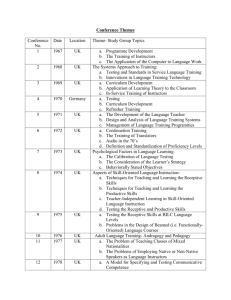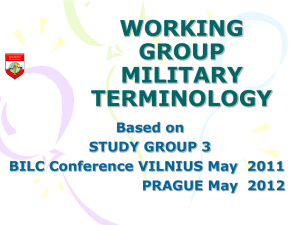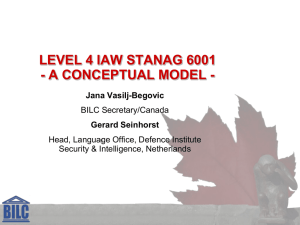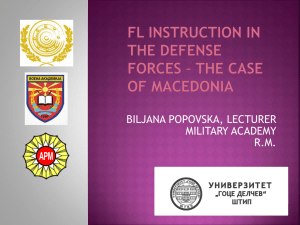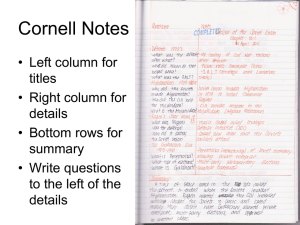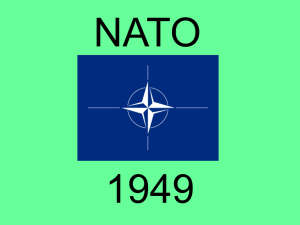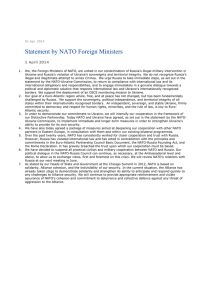Opening Briefing - Dubeau (BILC Chairman)
advertisement
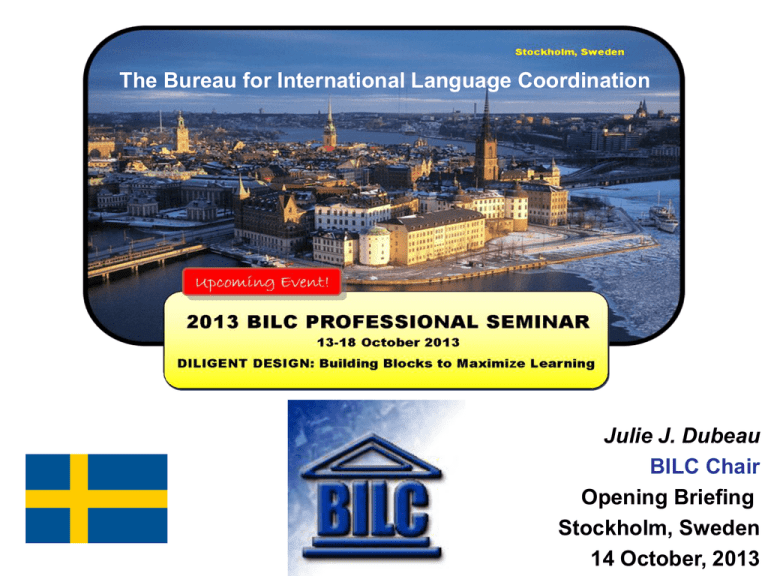
The Bureau for International Language Coordination Julie J. Dubeau BILC Chair Opening Briefing Stockholm, Sweden 14 October, 2013 Outline • What is BILC? – Membership, Secretariat, Mandate – Programme of work • Seminar Theme : Design • Updates BILC BILC was established in 1966 as an advisory body to NATO. The founding members are France, Germany, Italy, the United Kingdom, and the United States. 1967: Belgium, Canada, Netherlands 1975: SHAPE and IMS/NATO (non-voting members) 1978: Portugal 1983: Turkey 1984: Denmark and Greece 1985: Spain 1993: Norway 1999: Czech Republic, Hungary, Poland 2004: Bulgaria, Estonia, Latvia, Lithuania, Romania, Slovakia, Slovenia 2008: Albania, Croatia Partner countries routinely participate. All nations are welcome to attend and/or observe. The BILC Chair presides over the Steering Committee which meets at the spring conference. Voting members are the heads of NATO delegations. BILC Steering Committee Chair J. Dubeau GRB (1966-1981) DEU (1982-1996) USA (1997-2008) CAN (2008-2014) XXX (2014- Senior Advisor Dr. R. Clifford Secretary J. Vasilj-Begovic Language Testing Programmes P. Garza Associate Secretaries Language Training Assessments K. Wert BILC’s Mandate Mission: To promote and foster interoperability among NATO and PfP nations by furthering standardization of language training and testing. To support the Alliance's operations through the exchange of knowledge and best practices, IAW established procedures and agreements. Vision: To achieve levels of excellence where progress made by one is shared by all. NATO Language Context: Complicated and Complex! • Each nation is responsible for own training / testing program • No common tests - only a common standard - STANAG 6001 • Nations certify their military with SLPs based on own STANAG–based tests. • Varying interpretations of standard? • SLPs of job descriptions may not reflect actual language requirements • Language is #1 shortfall on deployments: 2010 JALLC Report BILC Programme of Work • Plan the 3 annual main events : - Annual BILC Conference, - BILC Professional Seminar, and - STANAG 6001 Testing Workshop; • Organize & deliver specialized seminars & workshops; • Conduct research / special projects, & support nations; • Lead cooperative assistance visits to requesting NATO & Partner countries (language training & testing programmes); • Report to NATO HQ, NTG, ACT and others as required. BILC Main Events BILC Annual Conference in Spring: 2013 hosted in Tbilisi by Georgia “NATO speak: English in Multinational Settings” Steering Committee met daily 68 participants, 23 presentations + 5 Study groups SG #1 - What is NATO Speak? SG #2 - Enhancing Cross-Cultural Communication within MultiNational Settings SG #3 - On-line Language Maintenance SG #4 - Standardizing the Application of STANAGs Across Foreign Languages SG #5 - Questionnaire Deployment Lessons Learned Definitions What is NATO Speak? • It is the language used in each NATO location which encompasses the acronyms, abbreviations and terminology used, an understanding of the organizational mission and culture and the jargon appropriate to that location. What should it be? • It should be clear communication in plain English which facilitates interoperability and effective accomplishment of NATO missions. BILC Main Events BILC Annual Conference in Spring: Next Conference in Bruges, Belgium, 4-9 May 2014 Theme: “Forging Effective Partnerships to Optimize Operational Success” Some sub-themes (list to be expanded): - Micro Level Civilian and Military Collaborations - Harmonizing Performance and Proficiency Training - Collaborative Educational Frameworks - Civilian and Military Instructional Partnership BILC Main Events BILC Professional Seminar in Fall 2012 hosted in Bled by Slovenia “BACK TO BASICS: RECIPES FOR INSTRUCTIONAL SUCCESS” 73 Delegates, 28 Presentations + Daily Panels Next Professional Seminar will be hosted by Germany in Ellwangen, 12-17 October 2014, Theme TBD BILC Professional Seminar, Bled, Slovenia October 21-25, 2012 BILC Main Events STANAG Testing Conference New name!! STANAG 6001 Testing Workshop Last hosted 3-5 September, 2013 by Mike!! (SHAPE) in Mons STANAG 6001 TESTING: INTEGRATING TEST DEVELOPMENT STAGES Next STANAG 6001 Testing Workshop will be hosted by Austria at Castle Rothschild at Reichenau/Rax 8-12 September 2014 BILC Main Events BILC Programmes Assistance to National Testing Programmes: – Planned: Russia Nov 2013 – Potential: Algeria, Uzbekistan, Mongolia, Greece Language Testing Seminar (LTS): 2 weeks, 2X per year Advanced Language Testing Seminar (ALTS): 3 weeks, 2X per year - Offered to graduates from the LTS NEW! Language Standards and Assessment Seminar (LSAS) Cooperative Language Training Assessments – Planned: Russia June 2014 BILC / Russia - NRC Work Plan http://www.nato-russia-council.info/en/articles/20130911-nrc-linguistics-experts/ What is design? And why do we care? de·sign Noun - an outline, sketch, or plan, as of the form and structure of a work of art, an edifice, or a machine to be executed or constructed… Verb - to prepare the preliminary sketch or the plans for (a work to be executed), especially to plan the form and structure of: to design a new bridge… good design bad design bad design Design In an educational context: • Design is the process by which instructional strategies (methods, media, environments) are selected, described (and costed for a learning event). • Development is the process by which effective instructional design materials that support the design of IT&E are produced or acquired. Source: CAF Campus ‘Learning Without Boundaries’ Operation Framework, 2013 Annex A 4705-1 (CDA) Feb 2013 MSLETP (English) PC 401 English modular courses Level A PL 1 PL 2 PL 3 PL 4 Advanced English Course Level C English modular courses Level B PL 5 24 months max (local training) PC 403 PC 402 PL 6 PL 7 Refresher B Profile PL 8 PL 9 PL 10 PL 11 10 weeks between PL 12 months max (local training) Consolidation 3 weeks 18 months max (local training) Continuous French Course Level B (CECLB) PL1 / PL 2 / PL 3 / PL 4 PL 5 / PL 6 / PL 7 Progress Levels (PL) generally include 150 hours (five weeks) of training in a classroom Posting for up to 11 months Continuous courses entry points Continuous English Course Level C (CECLC) Refresher A Profile PL5 / PL 6 / PL 7 Refresher B Profile /PL 8 / PL 9/PL 10/PL 11/Consolidation Posting for up to 11 months AAA Profile BBB Profile CBC Profile Updates • • • • BILC Secretariat status Ownership of the STANAG 6001 LNA – NATO IMS/SHAPE/ACT??? Statement from BILC re IS equivalency table – IS meeting • WG on Level 4 - Final report – Will produce prototype of L4 test • WG on Translation & Terminology – ongoing • BILC Website design & ownership BILC Website www.natobilc.org Enjoy the 2013 Professional Seminar!! “Diligent Design: Building Blocks to Maximize Learning” QUESTIONS ??
